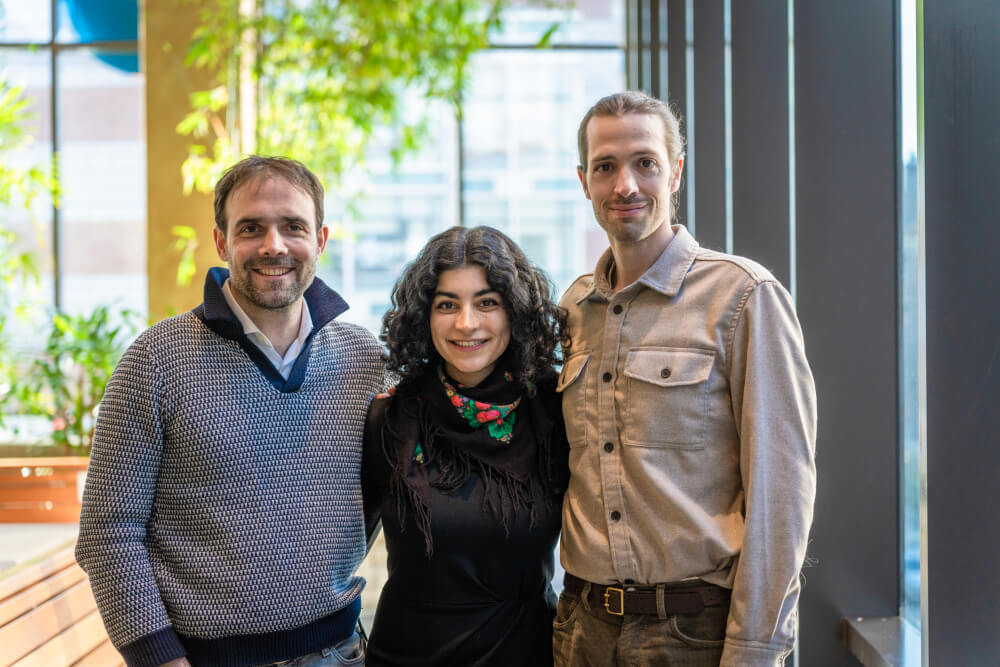On a wave of promising research and positive media stories, psychedelic drugs are edging closer to mainstream use for treating a variety of mental disorders. A clinical trial recently launched by Dana-Farber investigators is the first to evaluate such an agent in patients receiving hospice care.
The trial, which plans to enroll 15 patients served by hospice provider Care Dimensions, will assess whether psychedelic-assisted therapy is safe and feasible in a hospice population, whether it helps alleviate the experience of demoralization, and how it impacts patients’ physical, psychosocial, and spiritual well-being. Three patients have already received treatment as part of the trial and the results are encouraging, investigators say.
The trial is run by the Institute’s Psychedelic-Assisted Therapy program, reflecting the program’s orientation toward research. The program’s members — Yvan Beaussant, MD; Roxanne Sholevar, MD; and Zachary Sager, MD, of Psychosocial Oncology and Palliative Care — hope to add a training component for clinicians interested in providing this type of therapy and, once additional psychedelic drugs are legalized, to offer this form of therapy at Dana-Farber.
“As more patients and health-care providers hear about psychedelic-assisted therapies and become interested in them, we’re receiving a variety of questions about work begin done in this area,” Sholevar says. “As a program, we’re thinking about how to position ourselves as not just a research group, but a hub for expertise, information, and counseling.”

Changing perceptions
Attitudes toward psychedelic drugs are undergoing a radical revision as research reveals their therapeutic potential. Outlawed in the 1960s and ’70s following reports of “bad trips,” psychosis, and accidental deaths, the drugs are demonstrating an ability, when used under proper conditions, to alleviate demoralization and anxiety, often in people who have suffered for years and not benefited from other therapies.
Psychedelic agents, which remain under a federal ban but are considered likely to gain approval for therapeutic use in the next several years, induce a state of altered consciousness and changed perceptions of reality. Used in conjunction with guidance from a trained therapist, a psychedelic experience can have a profound, emotionally expansive effect on patients with depression, anxiety, post-traumatic stress disorder, or addiction disorders, often in just one session, research is showing.
“Despite some progress, we still have only limited success in treating people’s psycho-existential-spiritual distress,” Sholevar relates. “We have traditional psychopharmacology and standard psychotherapy, but these often take a fair amount of time to produce results, and some patients, such as those with terminal illness, may not have much time. Psychedelic-assisted therapy can yield improvements in a very brief period.”
The emotional needs of a hospice population track closely with the potential benefits of psychedelic-assisted therapy, she continues. “The existential and spiritual components of the distress that some people feel at the end of life is unique to this population. We’ve found that treating people with these substances often opens a more psycho-existential and spiritual dimension of what they’re experiencing. We’re hoping this can be a pathway to connecting people with the psychosocial and spiritual care services that exist.”
In developing the trial, Dana-Farber investigators worked closely with staff at Care Dimensions. The staff identifies patients who might benefit from treatment with psilocybin, a psychedelic agent, and asks them if they’re interested in participating. If they are, they’re sent reading materials about the therapy and the trial. If they’re still interested, they meet with Beaussant and/or Sager (the principal investigator and psychiatrist, respectively, for the study) to get more information and to enroll.
The treatment itself is bookended by sessions with a two-person team of psychotherapists – meetings critical to the therapy’s safety and efficacy. Prior to treatment, the therapists educate patients about the effects of psilocybin, discuss what patients hope to gain, and talk about how patients can navigate difficult emotions that may occur during treatment. After the treatment, the therapists meet with patients to review their experience and help solidify key moments and insights that may have emerged.
The day of treatment, patients come to the hospice house in the morning (Care Dimensions patients ordinarily receive hospice services in their own homes) and check in with the two therapists, who will stay with them throughout the therapy. A nurse is assigned to them for the day and their medical status is monitored closely. Psilocybin is active for approximately six hours, after which patients are monitored and assessed for discharge by the study team before returning home.
By meeting with participants several times before and after treatment, study leaders gauge whether the treatment has been beneficial. Although just three of the planned 15 patients have completed the trial, the early signs are positive.
“What I saw, in terms of how patients relate to their emotions, work through their emotions, relate to us, the therapists, and to their family members, it’s produced the kinds of shifts that I have seen after years, and sometimes never, in treating people in weekly psychotherapy,” Sholevar says. “It’s really exciting.”

Wonderful! Can’t wait until it’s legal.